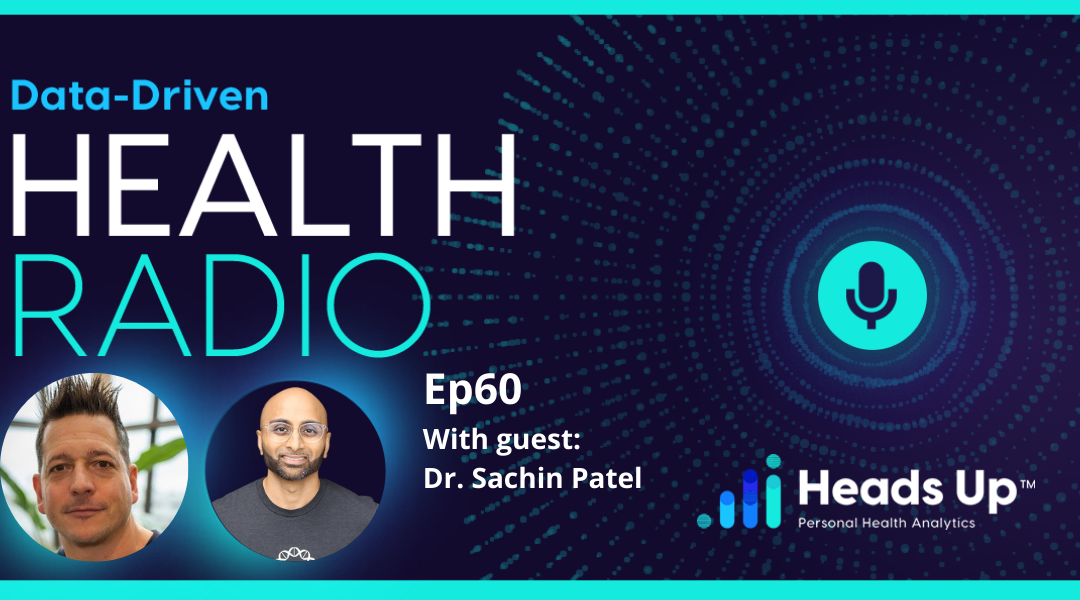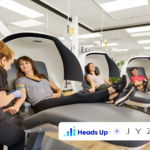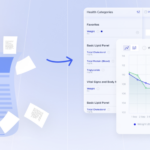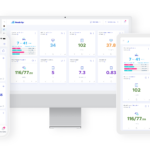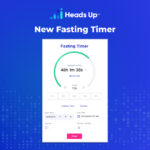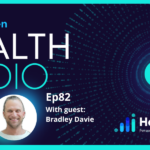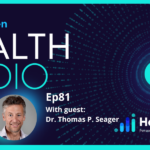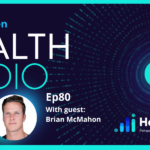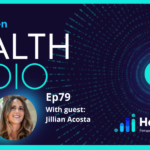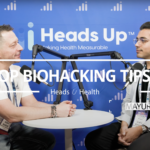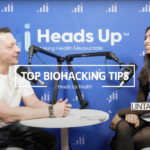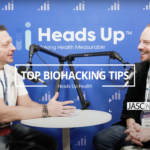Podcast: Play in new window | Download
Subscribe: Apple Podcasts | RSS
About the Episode
Dr. Sachin Patel of The Living Proof Institute and Perfect Practice Mentorship sits down with Dave Korsunsky to discuss how Dr. Patel implements the Oura Ring into his practice. The pair dive into their favorite metrics to monitor, how to build a successful practice, and how each of them got into functional medicine.
“Getting people more parasympathetic heals and it helps restore the function of all of their organ systems. It also restores blood flow to those organ systems.”
– Dr. Sachin Patel
Heads Up
This podcast is brought to you by Heads Up, a web app designed to help both individuals and health practitioners centrally track the vital health data that matters. Instantly synchronize your (or your clients’) medical records, connect favorite health devices and apps, and use the data to optimize your health (and that of your clients).
Click on the button below to start your free 30-day trial. Or, read on for more information about our latest podcast episode!
Living Proof Institute
The Living Proof Institute offers personal and corporate health solutions. Our goal is to improve the health and wellness of our community by improving the health of its citizens. Our mission is accomplished by patient education, dietary and lifestyle consulting, exercise prescription, and advanced functional laboratory testing.
Perfect Practice Mentorship
Perfect Practice is a world-class personal, professional, and practice development mentorship. Our mission is to provide simple, practical and affordable growth tools to help functional medicine practitioners and coaches deliver transformational care for their clients.
Dr. Sachin Patel
Sachin is a father, husband, philanthropist, functional medicine practice success coach, international speaker, and best-selling author whose philosophy is that, “The doctor of the future is the patient.”
He founded The Living Proof Institute and coaches practitioners all over the world on how to step into their power and profoundly serve their communities.
And, he has taught thousands of functional medicine professionals how to start, grow, and scale their practices.
Show Notes
(2:10) Dave talks about how practices can use wearable technology to benefit their patients. Practices can get rapid feedback, personalized programs, and more.
(3:15) Dr. Patel started as a chiropractor for sports, soft tissue, and repetitive strain injuries. He ended up on the news, which resulted in more than 50 people calling his practices. All of these people had chronic health issues, as opposed to soft tissue injuries. This led Dr. Patel to functional medicine.
(3:43) Dr. Patel started the Living Proof Institute in Cincinnati, Ohio. The institute helps people get to the root cause using functional medicine, lifestyle, medicine, and mindset to help them heal.
(3:56) He moved back to Toronto to start another clinic. Other practices started reaching out to him about how he built his own practice. This led Dr. Patel to coaching. His goal is to establish a movement to create and deploy an army of practitioners that are making the world a better place and using technology in a responsible way to enhance their clinical outcomes.
(5:37) Dave reflects on how a functional doctor helped him identify the root cause of his health issues. This led him to move off of the Western diet and ignited a series of personal health changes.
(7:04) Dr. Patel shares how he grew up eating a bunch of grains as a vegetarian. He started removing gluten and dairy from his diet. This included meat substitutes which were stitched together with gluten.
(8:07) He would wake up tired, stiff, and achy every morning. He had major digestive issues. After altering his diet, his skin cleared up and many of his issues disappeared. He has now been gluten free for over a decade.
(9:44) Dave discusses how he is also now an early morning person.
(10:22) Dave shares how understanding Oura Ring metrics on himself now helps him interpret the data of his loved one’s through Heads Up.
(11:45) Dr. Patel met Harpreet Rai (CEO of Oura Ring) at Genius Network. This led him to invite Oura to come to Dr. Patel’s in-person event, which resulted in dozens of practitioners ordering rings.
(12:22) In Ontario, Dr. Patel had to figure out what claims he could make regarding his messaging. He decided to focus on vitality and health optimization.
(13:13) Dr. Patel realized that boards would go after practitioners requesting testing. Dr. Patel wanted to create a program that doesn’t use testing.
(14:44) Dr. Patel wants patients to become their own doctor by having data. People who were put on a lifestyle design program were getting amazing results in 3-6 weeks. They got off their meds, lost 20-60 pounds, and transformed their health before getting tests done.
(15:44) By improving lifestyle and environment, there’s collateral benefit to their entire family. They want to teach the figurehead in the household how to create an environment of health in the home.
(16:17) In one family, a woman lost 27 pounds, the husband lost 45 pounds, and the daughter lost 27 pounds. Dr. Patel doesn’t want skinnier versions of people, but healthier versions of people.
(17:12) Dr. Patel focuses on heart rate variability (HRV). HRV correlates to bone health, muscle health, brain health, immune system function, digestive function, and other systems in the body. He tracks HRV through the Oura Ring.
(18:01) Dr. Patel gets 50-100 Oura Ring sizing kits delivered directly to his practice at a time. He includes a sizing kit in each client’s welcome package.
(19:11) Dave discusses the limitations of working within the Canadian system. Dave’s sister is a naturopathic doctor in Winnipeg and she can’t order labs for her patients, even a simple Vitamin D test.
(21:38) Dave talks about why it’s a great idea for Dr. Patel to stock the sizing kits for his clients to reduce friction when ordering the Oura Ring.
(23:50) Dave believes combining metrics and using that for engagement opportunities is the best approach for practices.
(24:36) Dr. Patel discusses how they use a health coach. Their patients can do a daily check. They can submit a journal entry, log their weight, hydration, bowel movements, sleep scores, and any other questions they may have.
(25:24) Dr. Patel’s practice shares patient progress, oftentimes through Heads Up Health Reports, during follow up meetings. The practice focuses primarily on sleep and HRV. The patient shares information the ring can’t tell them and Heads Up gives them information that the patient can’t tell them.
(26:53) Practices don’t need to be perfect to get started. You learn things and make improvements along the way.
(28:19) Dr. Patel enjoys gamifying within his community. He can hold sleep score contests with his clients.
(28:52) Dave talks about how the Heads Up employees all have their Oura Rings connected and a Slack Channel to discuss their scores.
(29:59) Dave goes over some of the best metrics to monitor using the Oura Ring. These metrics include resting heart rate, temperature deviation, HRV, the actual readiness score, the respiration rate, and the sleep score. Temperature deviation can be a precursor to pending illness. Respiration rate can indicate impending illness and level of cardiovascular health.
(32:11) You can’t cheat heart rate variability. It shows how somebody is handling a stressful situation. Dr. Patel uses HRV as a measure of resilience. HRV is a good measure of parasympathetic tone; a good indicator of how well we’re recovering, repairing, and regenerating.
(34:50) Sleep is one of the most important things that we do. It is the most parasympathetic thing that we do. The Oura Ring shows how well protocols and recommendations are working.
(36:10) Dr. Patel had a friend who couldn’t sleep and Dr. Patel recommended that he turn off all artificial lighting after the sun goes down. His friend felt better, but the Oura Ring showed him the value within the data.
(37:18) Dr. Patel also focuses on respiratory rate. He uses a nose strip, mouth tape, and proper positioning when he sleeps.
(37:45) Dave tries to think about the central nervous system when he prioritizes his help. He turns the lights down early before bed and views it as the goal of meditation.
(39:07) Changing how you consume alcohol or cannabis can help with sleep onset. Water can also be used as an excellent source of relaxation therapy.
(40:28) The key to Dr. Patel’s program is to pair your nervous system with the activity that you are trying to accomplish.
(41:18) Bob Rakowski shared a study that measured blood flow in extreme athletes. A sprinter, in a very fight or flight state, is sending only 5% of his blood flow to his liver and kidneys when he’s in that state. At rest, they send 50% to those organs.
(41:46) If you want someone to detox better, the key is to increase blood flow and nutrients to the organ system so they can function properly. By healing your parasympathetic system, that helps restore function and blood flow to their organ systems.
Your digestive system works better when you’re parasympathetic. Instead of changing your diet, slow down, chew your meal, enjoy it, and be grateful for it. Western culture views food as an inconvenience.
Our digestive system is most effective in mid-day when the sun is in the highest position (not necessarily noon). That’s when you should have your biggest meal. The most parasympathetic thing you can do right after that is take a nap and digest that meal, instead of going to exercise immediately after.
(43:24) Dave noticed that he should eat his biggest meal around 3pm.
(46:26) Dr. Patel noticed that food choices, meal timing, and stress affect HRV. You can’t eliminate stress, but you can change how they interpret it. If somebody’s HRV is not responsive, he starts to look into trauma. There may be something that is keeping them in a sympathetic state despite the fact that their physical health is improving.
(48:36) There are many things that are easily modifiable in our day-to-day life; our environment, lighting before bedtime, ambient bedroom temperature, meal timing, and meal choices.
(49:06) When you want to move on to the next level, you look at things that are psychospiritual including stressors in relationships with others and yourself.
(49:36) Dave and Dr. Patel discuss the power of plant medicines. Dr. Patel had a patient who had a 30% permanent improvement in their HRV score after a psilocybin ceremony.
(50:55) In Dave’s personal experience, if his HRV numbers are in the 50s, he feels there is nothing that he can’t accomplish. He also makes sure that he doesn’t overtrain.
(53:04) Dr. Patel looks at how long it takes him to sink into resting heart rate and calibrates his day accordingly. Sometimes our body will tell us one thing, but our mind can always tell us something else. He gives himself permission to override the data and choose how he feels about the day.
(55:40) Dr. Patel gives insight into how patients respond to remote patient monitoring. When he tells people that they offer remote patient monitoring, it serves as a filtration process. People who don’t like to be measured won’t want to sign up.
(57:03) Dave likes wearable technology and biometric data in the clinical setting because it holds both the patient and the practitioner accountable.
(58:40) Remote patient monitoring validates practitioners’ processes. It is evidence that their program works. There are practitioners that make big claims, but don’t have evidence to back that up. There are patients who say they’re doing certain things that may not be.
(1:01:23) The top three metrics that Dr. Patel personally lives by are HRV, fasting insulin, and high sensitivity CRP. HRV is instant biofeedback. Insulin resistance is a major predictor of many issues in your body or longevity. Fasting insulin shows how someone’s managing their metabolism, blood sugar. High sensitivity CRP is an inflammation marker.
